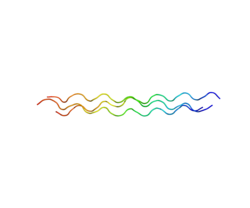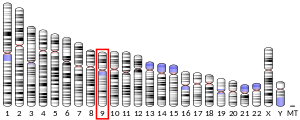Collagen, type V, alpha 1
Appearance
(Redirected from COL5A1)
Collagen alpha-1(V) chain is a protein that in humans is encoded by the COL5A1 gene.[5][6]
This gene encodes an alpha chain for one of the low abundance fibrillar collagens. Fibrillar collagen molecules are trimers that can be composed of one or more types of alpha chains. Type V collagen is found in tissues containing type I collagen and appears to regulate the assembly of heterotypic fibers composed of both type I and type V collagen. This gene product is closely related to type XI collagen and it is possible that the collagen chains of types V and XI constitute a single collagen type with tissue-specific chain combinations. Mutations in this gene are associated with Ehlers-Danlos syndrome, types I and II.[6]
See also
[edit]References
[edit]- ^ a b c GRCh38: Ensembl release 89: ENSG00000130635 – Ensembl, May 2017
- ^ a b c GRCm38: Ensembl release 89: ENSMUSG00000026837 – Ensembl, May 2017
- ^ "Human PubMed Reference:". National Center for Biotechnology Information, U.S. National Library of Medicine.
- ^ "Mouse PubMed Reference:". National Center for Biotechnology Information, U.S. National Library of Medicine.
- ^ Greenspan DS, Byers MG, Eddy RL, Cheng W, Jani-Sait S, Shows TB (May 1992). "Human collagen gene COL5A1 maps to the q34.2----q34.3 region of chromosome 9, near the locus for nail-patella syndrome". Genomics. 12 (4): 836–7. doi:10.1016/0888-7543(92)90320-R. PMID 1572660.
- ^ a b "Entrez Gene: COL5A1 collagen, type V, alpha 1".
Further reading
[edit]- Mann K (1992). "Isolation of the alpha 3-chain of human type V collagen and characterization by partial sequencing". Biol. Chem. Hoppe-Seyler. 373 (2): 69–75. doi:10.1515/bchm3.1992.373.1.69. PMID 1571108.
- Greenspan DS, Cheng W, Hoffman GG (1992). "The pro-alpha 1(V) collagen chain. Complete primary structure, distribution of expression, and comparison with the pro-alpha 1(XI) collagen chain". J. Biol. Chem. 266 (36): 24727–33. doi:10.1016/S0021-9258(18)54290-3. PMID 1722213.
- Takahara K, Sato Y, Okazawa K, et al. (1991). "Complete primary structure of human collagen alpha 1 (V) chain". J. Biol. Chem. 266 (20): 13124–9. doi:10.1016/S0021-9258(18)98813-7. PMID 2071595.
- Yaoi Y, Hashimoto K, Koitabashi H, et al. (1990). "Primary structure of the heparin-binding site of type V collagen". Biochim. Biophys. Acta. 1035 (2): 139–45. doi:10.1016/0304-4165(90)90108-9. PMID 2203476.
- Seyer JM, Kang AH (1989). "Covalent structure of collagen: amino acid sequence of three cyanogen bromide-derived peptides from human alpha 1(V) collagen chain". Arch. Biochem. Biophys. 271 (1): 120–9. doi:10.1016/0003-9861(89)90262-2. PMID 2496661.
- Niyibizi C, Fietzek PP, van der Rest M (1984). "Human placenta type V collagens. Evidence for the existence of an alpha 1(V) alpha 2(V) alpha 3(V) collagen molecule". J. Biol. Chem. 259 (22): 14170–4. doi:10.1016/S0021-9258(18)89872-6. PMID 6501291.
- Mumby SM, Raugi GJ, Bornstein P (1984). "Interactions of thrombospondin with extracellular matrix proteins: selective binding to type V collagen". J. Cell Biol. 98 (2): 646–52. doi:10.1083/jcb.98.2.646. PMC 2113082. PMID 6693501.
- Rhodes RK, Miller EJ (1982). "Evidence for the existence of an alpha 1(V) alpha 2(V) alpha 3(V) collagen molecule in human placental tissue". Coll. Relat. Res. 1 (4): 337–43. doi:10.1016/s0174-173x(81)80010-6. PMID 7346227.
- Lee S, Greenspan DS (1995). "Transcriptional promoter of the human alpha 1(V) collagen gene (COL5A1)". Biochem. J. 310 (1): 15–22. doi:10.1042/bj3100015. PMC 1135848. PMID 7646438.
- Moradi-Améli M, Rousseau JC, Kleman JP, et al. (1994). "Diversity in the processing events at the N-terminus of type-V collagen". Eur. J. Biochem. 221 (3): 987–95. doi:10.1111/j.1432-1033.1994.tb18815.x. PMID 8181482.
- Takahara K, Hoffman GG, Greenspan DS (1996). "Complete structural organization of the human alpha 1 (V) collagen gene (COL5A1): divergence from the conserved organization of other characterized fibrillar collagen genes". Genomics. 29 (3): 588–97. doi:10.1006/geno.1995.9961. PMID 8575750.
- De Paepe A, Nuytinck L, Hausser I, et al. (1997). "Mutations in the COL5A1 gene are causal in the Ehlers-Danlos syndromes I and II". Am. J. Hum. Genet. 60 (3): 547–54. PMC 1712501. PMID 9042913.
- Tillet E, Ruggiero F, Nishiyama A, Stallcup WB (1997). "The membrane-spanning proteoglycan NG2 binds to collagens V and VI through the central nonglobular domain of its core protein". J. Biol. Chem. 272 (16): 10769–76. doi:10.1074/jbc.272.16.10769. PMID 9099729.
- Sasaki T, Brakebusch C, Engel J, Timpl R (1998). "Mac-2 binding protein is a cell-adhesive protein of the extracellular matrix which self-assembles into ring-like structures and binds beta1 integrins, collagens and fibronectin". EMBO J. 17 (6): 1606–13. doi:10.1093/emboj/17.6.1606. PMC 1170508. PMID 9501082.
- Wu YL, Sumiyoshi H, Khaleduzzaman M, et al. (1998). "cDNA sequence and expression of the mouse alpha1(V) collagen gene (Col5a1)". Biochim. Biophys. Acta. 1397 (3): 275–84. doi:10.1016/S0167-4781(98)00016-5. PMID 9582436.
- Burrows NP, Nicholls AC, Richards AJ, et al. (1998). "A point mutation in an intronic branch site results in aberrant splicing of COL5A1 and in Ehlers-Danlos syndrome type II in two British families". Am. J. Hum. Genet. 63 (2): 390–8. doi:10.1086/301948. PMC 1377290. PMID 9683580.
- Aho S, Uitto J (1999). "Two-hybrid analysis reveals multiple direct interactions for thrombospondin 1". Matrix Biol. 17 (6): 401–12. doi:10.1016/S0945-053X(98)90100-7. PMID 9840442.
- Giunta C, Steinmann B (2000). "Compound heterozygosity for a disease-causing G1489E [correction of G1489D] and disease-modifying G530S substitution in COL5A1 of a patient with the classical type of Ehlers-Danlos syndrome: an explanation of intrafamilial variability?". Am. J. Med. Genet. 90 (1): 72–9. doi:10.1002/(SICI)1096-8628(20000103)90:1<72::AID-AJMG13>3.0.CO;2-C. PMID 10602121.
- Imamura Y, Scott IC, Greenspan DS (2000). "The pro-alpha3(V) collagen chain. Complete primary structure, expression domains in adult and developing tissues, and comparison to the structures and expression domains of the other types V and XI procollagen chains". J. Biol. Chem. 275 (12): 8749–59. doi:10.1074/jbc.275.12.8749. PMID 10722718.








